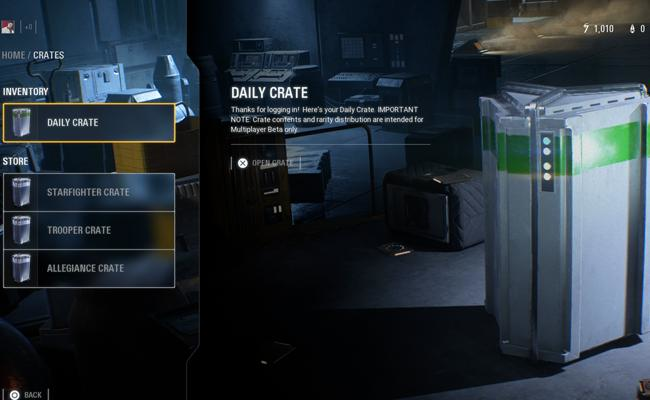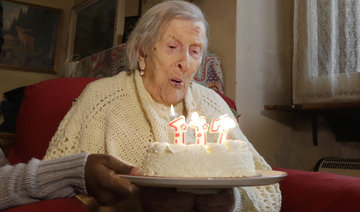SAN FRANCISCO: A new “Star Wars” video game is drawing fire for a feature that essentially allowed money instead of skill to determine who wins.
Game giant Electronic Arts has been criticized over its use of “loot boxes,” a money-making tactic for game makers which typically offer digital items such as stylish outfits for characters or decorations for in-game abodes.
Until recently, game makers had been careful to require players to rely on skills for weapons or abilities that could help beat challenges or adversaries.
But the spin EA put on “loot boxes” while readying “Star Wars Battlefront II” for launch was skewered by gamers as violating the credo of fair play and likened by some critics to gambling aimed at an audience that included children.
The controversy centers on prompting players to chance money on loot boxes that hold unknown assortments of in-game goods such as devastating weapons, powerful abilities, or items needed to purchase coveted characters like Luke Skywalker or Darth Vader.
EA was accused of going too far by forcing players to bet on loot boxes to advance or be forever matched up against better-armed adversaries.
As Twitter user @TmarTn lamented, “I miss having cheat codes in video games. Now it’s just your credit card number.”
While loot boxes can be earned through many hours of play, a widely circulated post on “Star Wars Gaming” estimated that it would require 4,525 hours, versus $2,100, to unlock everything in the game.
Jim Sterling, a British reviewer and noted critic of the big budget games industry, called the experience a “grueling slog for those unwilling to pay more money” than the $60-$80 box price of the game.
Fans weren’t the only source of pressure for EA.
The Wall Street Journal reported that a high-level executive at Disney-Lucasfilm sent word to Electronic Arts that the film giant was unhappy with how the backlash was marring the image of its beloved “Star Wars” franchise.
On the eve of the release of “Battlefront II,” EA turned off the ability to spend money in-game, saying in a statement that “we will now spend more time listening, adjusting, balancing and tuning” before reinstating the ability to purchase loot boxes.
Oddly enough, loot boxes remain the only way to obtain most items in the “Star Wars” game. That relegates players to earning loot boxes through countless hours of play, or putting the game aside until EA introduces a modified way to get goods.
Some players have decided they’ve waited long enough. A petition at change.org calling on Lucasfilm to revoke EA’s license to the Star Wars brand had gathered nearly 50,000 signatures as of Tuesday.
The loot box debate has gone political. The Belgian Gaming Commission recently launched an investigation into whether loot boxes in “Battlefront II” and smash hit “Overwatch” constitute gambling, and Hawaii congressman Chris Lee has branded EA’s new game “a Star Wars-themed online casino.”
In a video posted on YouTube, Lee slammed the new title for being “designed to lure kids into spending money,” adding, “It’s a trap.”
UK Gambling Commission Executive Director Tim Miller weighed in with an online post on Saturday, warning that “We are concerned with the growth in examples where the line between video gaming and gambling is becoming increasingly blurred.”
The Entertainment Software Association, a video game industry trade group, has come out in defense of loot boxes.
“Loot boxes are a voluntary feature in certain video games that provide players with another way to obtain virtual items that can be used to enhance their in-game experiences,” the association said.
“They are not gambling.”
Sales figures were not available, but industry intelligence website Gamesindustry.biz reported that opening week sales of the “Battlefront II” were down about 60 percent in Britain compared to first week sales of its predecessor.
Despite the furor, loot boxes and other in-game purchase strategies are likely here to stay. Superdata reports that “add-on content sales are increasingly out-earning the traditional one-time purchase model, and the trend shows no signs of slowing.”
Money changes everything: Backlash grows on ‘Star Wars’ video game ‘loot boxes’
Money changes everything: Backlash grows on ‘Star Wars’ video game ‘loot boxes’

World’s oldest person dies at 116 in Japan

- Tomiko Itooka was born on May 23, 1908 in the commercial hub of Osaka, near Ashiya
- As of September, Japan counted more than 95,000 people who were 100 or older
TOKYO: The world’s oldest person, Japanese woman Tomiko Itooka, has died aged 116, the city where she lived, Ashiya, announced on Saturday.
Itooka, who had four children and five grandchildren, died on December 29 at a nursing home where she resided since 2019, the southern city’s mayor said in a statement.
She was born on May 23, 1908 in the commercial hub of Osaka, near Ashiya – four months before the Ford Model T was launched in the United States.
Itooka was recognized as the oldest person in the world after the August 2024 death of Spain’s Maria Branyas Morera at age 117.
“Ms Itooka gave us courage and hope through her long life,” Ashiya’s 27-year-old mayor Ryosuke Takashima said in the statement.
“We thank her for it.”
Itooka, who was one of three siblings, lived through world wars and pandemics as well as technological breakthroughs.
As a student, she played volleyball.
In her older age, Itooka enjoyed bananas and Calpis, a milky soft drink popular in Japan, according to the mayor’s statement.
Women typically enjoy longevity in Japan, but the country is facing a worsening demographic crisis as its expanding elderly population leads to soaring medical and welfare costs, with a shrinking labor force to pay for it.
As of September, Japan counted more than 95,000 people who were 100 or older – 88 percent of whom were women.
Of the country’s 124 million people, nearly a third are 65 or older.
Former UK home secretary mocked for claiming she visited ‘land border’ between Italy and Turkiye

- Suella Braverman was criticized for her ignorance by social media users, public figures
- Italy and Turkiye are separated by hundreds of kilometers and share no border
LONDON: Former UK Home Secretary Suella Braverman faced widespread ridicule after claiming in a radio interview that she visited a land border between Italy and Turkiye — two countries separated by hundreds of kilometers.
Speaking on LBC Radio on Thursday morning, Braverman, known for her hardline anti-immigration stance, described visiting what she said was a wall built by Italy to stem migration.
“Italy have reinforced their borders. They built a wall. I went to see that wall,” she said.
“They built a wall on the land border between Italy and Turkey. They’ve got drones. They’ve got armored vehicles. They’ve got soldiers. The numbers crossing that border have plummeted.”
The statement quickly went viral, with social media users and public figures mocking the former Home Secretary for referencing a non-existent border.
Italy and Turkiye, located in southern Europe and western Asia respectively, share no land border.
Former Conservative MP Sir Michael Take responded sarcastically, suggesting that people were overreacting and quipping that Braverman should have claimed that “Italy had built (a wall) on its border with Syria.”
How easy of you all to leap on poor Suella Braverman for a simple slip of the tongue.
— Sir Michael Take CBE (@MichaelTakeMP) January 2, 2025
She didn’t mean to say the wall Italy built on its border with Turkey.
She was talking about the wall Italy had built on its border with Syria.
Show Suella some respectpic.twitter.com/ToLZImF7cH
Food critic Jay Rayner also shared the clip, jokingly asking: “And is this wall ‘on the land border between Italy and Turkey’ with you in the room right now?”
Others criticized the apparent ignorance displayed by a senior politician who once held responsibility for national security and immigration.
Portuguese journalist and political commentator Bruno Macaes commented on X: “How did we get to a point where British politics is a global laughing stock?”
British politician, former cabinet minister says she went to see the Italy-Turkey border. How did we get to a point where British politics is a global laughing stock? pic.twitter.com/MHvNvSqOAz
— Bruno Maçães (@MacaesBruno) January 2, 2025
Following the backlash, Braverman attempted to clarify her remarks, admitting on X that she had misspoken.
“And, obviously I meant Greece’s land border with Turkey which I was honoured to visit,” she wrote.
Bereaved orca seen carrying another dead calf in US waters

- Scientists say whales are among the world’s most intelligent animals, exhibiting complex social behavior including self-awareness and suffering
Washington, USA: A bereaved female killer whale who carried her dead calf for more than two weeks in 2018 has again lost a newborn and is bearing its body, US marine researchers said.
Scientists say whales are among the world’s most intelligent animals, exhibiting complex social behavior including self-awareness and suffering.
The Washington state-based Center for Whale Research said the endangered orca named Tahlequah, also known as J35, was spotted carrying her deceased calf in Puget Sound off Seattle on New Year’s Day.
“J35 has been seen carrying the body of the deceased calf,” the center said in an Instagram post Thursday.
“This behavior was seen previously by J35 in 2018 when she carried the body of her deceased calf for 17 days,” it said.
When Tahlequah was carrying her previous deceased newborn seven years ago she was seen sometimes nudging its body with her nose and sometimes gripping it with her mouth, US media reported.
“It’s a very tragic tour of grief,” Center for Whale Research founder Ken Balcomb told public broadcaster NPR at the time.
The center said the loss of the latest female newborn was “particularly devastating” because Tahlequah has now lost two of her four documented calves.
“We hope to have more information on the situation through further observation,” the post said.
The center also said Tahlequah’s pod had been joined by another newborn. “The calf’s sex is not yet known but the team reports that the calf appeared physically and behaviorally normal,” the center said.
Tahlequah and her pod mates are Southern Resident Killer Whales, a population listed as endangered in the United States.
There are only three pods in the population, numbering around 70 whales. They spend several weeks of each spring and fall in the waters of Puget Sound.
Their numbers are dwindling owing to a combination of factors, including a reduction in their prey and the noise and disturbance caused by ships and boats, according to the National Marine Fisheries Service.
Olympics-World’s oldest living gold medallist Agnes Keleti dies at 103

- Keleti joined the National Gymnastics Association in 1938 and won her first Hungarian championship in 1940
BUDAPEST: Five-time Olympic champion Hungarian gymnast Agnes Keleti, the world’s oldest living Olympic gold medallist and a survivor of the persecution of Jews in World War Two, died at the age of 103 on Thursday, the Hungarian Olympic Committee said.
Born as Agnes Klein in Budapest on Jan. 9, 1921, Keleti joined the National Gymnastics Association in 1938 and won her first Hungarian championship in 1940, only to be banned from all sports activities that year because of her Jewish origin.
“Agnes Keleti is the greatest gymnast produced by Hungary, but one whose life and career were intertwined with the politics of her country and her religion,” the International Olympic Committee said in a profile on its website.
The HOC said Keleti escaped deportation to Nazi death camps, where hundreds of thousands of Hungarian Jews were killed, by hiding in a village south of Budapest with false papers. Her father and several relatives died in the Auschwitz death camp.
She won her first gold at the Helsinki games in 1952 aged 31, when most gymnasts had long been retired, the HOC said.
Keleti reached the peak of her career in Melbourne in 1956, where she won four gold medals and became the oldest female gymnast to win gold, the HOC said. A year later Keleti settled in Israel, where she married and had two children.
Her 10 Olympic medals, including five golds, rank Keleti as the second most successful Hungarian athlete of all time, the HOC said. She has also received multiple Hungarian state awards.
Harry Chandler, Navy medic who survived Japan’s attack on Pearl Harbor, dies at 103

- Harry Chandler’s family says he died at a senior living center in Tequesta, Florida on Monday
- He had congestive heart failure but his doctors and nurses noted his advanced age when giving a cause of death
HONOLULU: Harry Chandler, a Navy medic who helped pull injured sailors from the oily waters of Pearl Harbor after the 1941 Japanese attack on the naval base, has died. He was 103.
Chandler died Monday at a senior living center in Tequesta, Florida, according to Ron Mahaffee, the husband of his granddaughter Kelli Fahey. Chandler had congestive heart failure, but Mahaffee said doctors and nurses noted his advanced age when giving a cause of death.
The third Pearl Harbor survivor to die in the past few weeks, Chandler was a hospital corpsman 3rd class on Dec. 7, 1941, when waves of Japanese fighter planes dropped bombs and fired machine guns on battleships in the harbor and plunged the US into World War II.
He told The Associated Press in 2023 that he saw the planes approach as he was raising the flag that morning at a mobile hospital in Aiea Heights, which is in the hills overlooking the base.
“I thought they were planes coming in from the states until I saw the bombs dropping,” Chandler said. His first instinct was to take cover and ”get the hell out of here.”
“I was afraid that they’d start strafing,” he said.
His unit rode trucks down to attend the injured. He said in a Pacific Historic Parks oral history interview that he boarded a boat to help pluck wounded sailors from the water.
The harbor was covered in oil from exploding ships, so Chandler washed the sailors off after lifting them out. He said he was too focused on his work to be afraid.
“It got so busy you weren’t scared. Weren’t scared at all. We were busy. It was after you got scared,” Chandler said.
He realized later that he could have been killed, “But you didn’t think about that while you were busy taking care of people.”
The attack killed more than 2,300 US servicemen. Nearly half, or 1,177, were sailors and Marines on board the USS Arizona, which sank nine minutes after it was bombed.
Chandler’s memories came flowing back when he visited Pearl Harbor for a 2023 ceremony commemorating the 82nd anniversary of the bombing.
“I look out there, and I can still see what’s going on. I can still see what was happening,” Chandler told The Associated Press.
Asked what he wanted Americans to know about Pearl Harbor, he said: “Be prepared.”
“We should have known that was going to happen. The intelligence has to be better,” he said.
After the war Chandler worked as a painter and wallpaper hanger and bought an upholstery business with his brother. He also joined the Navy reserves, retiring as a senior chief in 1981.
Chandler was born in Holyoke, Massachusetts, and lived for most of his adult life in nearby South Hadley, Mahaffee said. In recent decades he split his time between Massachusetts and Florida.
An avid golfer, he shot five hole-in-ones during his lifetime, his grandson-in-law added.
Chandler had one biological daughter and adopted two daughters from his second marriage, to Anna Chandler, who died in 2004. He is survived by two daughters, nine grandchildren, 17 great-grandchildren and five great-great-grandchildren.
Military historian J. Michael Wenger has estimated that there were some 87,000 military personnel on the island of Oahu the day of the attack. With Chandler’s death only 15 are still living, according to a tally maintained by Kathleen Farley, the California state chair of the Sons and Daughters of Pearl Harbor Survivors.
Bob Fernandez, who served on the USS Curtiss, also died this month, at age 100, and Warren Upton, 105, who served on the USS Utah, died last week.




















